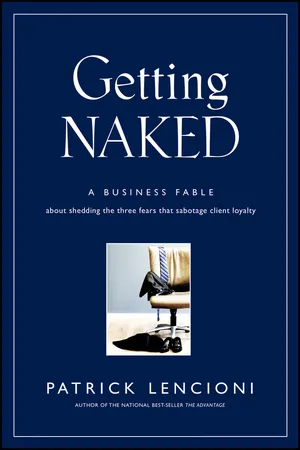![]()
![]()
ENEMIES
I can't say that I hated Michael Casey.
For one, Sister Rose Marie Hennessey had taught me in second grade that I should never hate anyone. And besides, I had never actually met Casey. I don't think you can really hate someone you haven't met, even if you ignore Sister Rose Marie's advice.
But I'm not going to lie; Michael Casey was one of my least favorite people in the world. Even the mention of his name could put me in a moderately bad mood.
And so, if you had told me a year earlier that I would spend four solid months of my professional life learning about him and his annoying little consulting firm, I would have told you it was time for me to change careers.
But that's exactly what happened, and I've lived to tell about it.
ME
I'm Jack Bauer, and yes, I share a name with that guy on TV who saved the world every year. Unlike him, though, I'm not a superhero. I'm just a consultant.
For five years I'd been working within the strategy practice at Kendrick and Black, a prestigious, international full-service management consulting firm headquartered in San Francisco.
In addition to being one of the senior consultants in our division, I headed up sales for the strategy practice of our firm. This meant I sometimes competed for clients with Michael Casey and his firm, Lighthouse Partners.
Now, Lighthouse was a much smaller firm than ours, and they focused most of their work in the Bay Area, so we didn't run up against them in more than 5 or 10 percent of the projects that we pursued. But when we did, we lost every single time.
That's not exactly true. We won once. But a year later the client, a small start-up called DecisionTech, threw us out and hired Lighthouse, which was more painful than losing to them in the first place. What was especially painful was the fact that all of these losses occurred in our own backyard, providing particularly high-profile defeats for all of our local peers to see. This only exacerbated our bitterness toward Michael Casey.
Keep in mind that, unlike in the world of sports, when you compete against a consulting firm you almost never actually see your competitors. But you hear about them. And after listening to story after story about how amazing and smart and effective Michael Casey and his team were, I would have liked nothing more than to hear they were going out of business.
Or so I thought.
HORRIBLE PROMOTION
When I was first told by a colleague that Michael Casey was leaving Lighthouse and that his firm was for sale, I was ecstatic. We had finally worn him down, I decided. There was a chink in their armor after all; no one could be that good.
When I learned that he was leaving to “spend more time with his family,” my euphoria diminished a little, but not much. Spending more time with your family was one of the most commonly used phrases for papering over a performance issue. Regardless of the reason, Lighthouse was up for sale and we wouldn't have to compete with and be humiliated by them ever again.
My glee at hearing about the demise of my enemy came to an abrupt end five days later when the founder of our firm, Jim Kendrick, pulled the rug out from under me.
Keep in mind that Jim had stopped by my office only twice before. Once to formally welcome me to his firm. Another time to warn me not to screw up a project for one of our biggest clients. He wasn't known for being overly warm or tactful.
“Here's the deal, Jack. You probably know about a little consulting firm over in Half Moon Bay called Lighthouse Partners.”
“Yeah, I know them.” I said it like I had never given them a second thought.
He continued, “Well, they were desperate to be sold in a hurry, and Marty said they were probably worth the risk. So we bought them before anyone else could. And so I wanted to—”
I was shocked and felt suddenly threatened, which is probably why, before he could finish, I interrupted: “What are we going to do with them?”
“We ... ” He paused, smiling a little condescendingly at my impatience. “ ... are going to have you manage it for a while. We want you to spend five or six months overseeing the firm, which shouldn't take more than half of your daily hours. As soon as you get your hands around what's going on over there, we can integrate whatever parts of it we decide to keep into our strategy division, and figure out what to do with the rest. And if all goes well, you should be heading the strategy division by then, given that Marty will be retiring next summer.” He paused as if he were simply out of words. “Okay then.” And he left.
Just like that, my world had been turned upside down, and for the rest of the day I couldn't decide how to digest it all. As I explained to my wife that night, I should have been happy. But there was something about the situation that made me uncomfortable.
Part of it was certainly the realization that if this went poorly, my career would be considerably damaged—and that I'd have Lighthouse Partners to thank for it. Michael Casey just might continue to haunt me even after his departure.
Another reason for my discomfort was the thought of having to finally meet the man, to sit down with him face-to-face to discuss the transition.
As it turned out, that would not happen.
ACCELERATION
Casey's departure from Lighthouse turned out to be more abrupt than anyone expected. As soon as the ink was dry on the deal, he was gone.
I was relieved by this, but less than I would have expected, probably because I was suddenly suspicious about whether there was something wrong at the firm.
When I asked my boss, Marty, about the circumstances, he shrugged. “I don't know. It happened so fast, we had very little time for any due diligence. But for Kendrick, the cost was relatively low, and for some reason he thought it was worth the risk.”
I sensed Marty wasn't telling me the whole story. “Come on—you were the one pushing hard for the deal, weren't you?”
Marty smiled. “Maybe.”
“So how are these people feeling about the whole thing?”
Marty shrugged. “I really have no idea. But you'll probably find out on Wednesday.”
“Wednesday?”
“Yeah.” Marty grinned. “You're meeting with the partners over at Lighthouse Wednesday morning.”
Marty was a wiry, well-dressed fifty-seven-year-old workaholic who had suddenly decided he was ready for early retirement and a chance at unlimited golf. And evidently he never had a Sister Rose Marie in second grade, because out of nowhere he remarked, “I really hate Michael Casey.”
Unlike me, Marty had actually met the man on a few occasions, and considering it was his division that Lighthouse had been beating up on for the past dozen years, I suppose his hatred could be at least partly justified.
“Phony,” “falsely modest,” and “self-righteous” were the terms Marty used to describe Casey. I can't deny that Marty's feelings influenced me—or more accurately, infected me—and encouraged my hostility toward our rival. But I didn't like losing any more than Marty did, so I had nurtured my own bitterness toward the man and his little firm during my five years at Kendrick and Black.
“What's your hypothesis about how all of this is going to pan out?” I wanted to know.
Marty took a breath and thought about it for a second. “It's hard to say for sure. But I'll tell you this: I don't see too many of their partners making it through the next year.”
“Why do you say that?”
“I don't know.” As he thought about it, he winced. “More than anything else, we just have two completely different cultures.”
I wasn't surprised by his comment, but I wanted a little more in terms of specifics. “For instance?”
This time he didn't hesitate. “From what I hear, the place is a country club.”
Marty could see that I didn't understand what he meant, so he explained. “They've got this funky office that used to be a kindergarten or preschool or something like that. I hear that their parking lot is empty by seven o'clock every night. They don't work weekends. Ever. It's a playground. Their partners would get eaten alive here.”
“Isn't that a problem for us?”
Marty shook his head and smiled. “Not really. We'll get their clients and the consultants who do all the real work. That's the reason we did the deal in the first place.”
I was starting to get a little nervous. “So, why don't you come with me Wednesday?”
Marty's eyes went wide. “Oh, I'd love to.”
I was relieved, until he continued, “But Kendrick and I agreed that this is something you need to do on your own. At least for now.” He paused. “But if you don't come back and give me a detailed, blow-by-blow account of the meetings, and a vivid and dramatic description of every detail about that damn company, I'll fire you.”
We laughed. Or at least he did. I was probably a little distracted, thinking about what would be coming on Wednesday.
BAND-AIDS
As a consultant, I had always advised my clients who acquired companies to accelerate the transitions and integrations, to avoid letting problems linger or fester. “Ripping the Band-Aid off quickly” is how I liked to characterize it. But now that I was the one doing the integrating and ripping, I was starting to question that advice. Still, I had no choice.
So, forty-eight hours after the contract had been signed, I found myself driving west along the crooked highway connecting the San Francisco Bay Area to the coastal town of Half Moon Bay. That's where the twenty-five employees of Lighthouse Partners were waiting to hear what I had to say about their future. They could not have been more curious than I was.
The Lighthouse office was not exactly what Marty had described. But it was darn close.
Standing alone and apart from the rest of the small agricultural town was a tiny campus of sorts, with four rectangular buildings separated by breezeways and small, neatly manicured lawns. It had certainly once been a school of some kind (I would later learn that it had been an elementary school for the developmentally disabled who were now being mainstreamed into the school system). Today it was the home of three companies: a small wine distributor, an agricultural supply sales office, and Lighthouse Partners.
After parking my car in what had once been a playground, I immediately saw why Michael Casey had chosen the name for his company. No more than a quarter of a mile to the west was a small but unmistakable lighthouse, mostly white with three equally spaced blue stripes. I wondered why so many people, including me, liked lighthouses so much.
The school building reminded me of my own grammar school, except that this one had been spruced up and redecorated to look somewhat corporate. I was surprised—and, I'll admit, somehow pleased—to see that the bathrooms in the center of the building still had “Boys” and “Girls” signs on the outsi...


